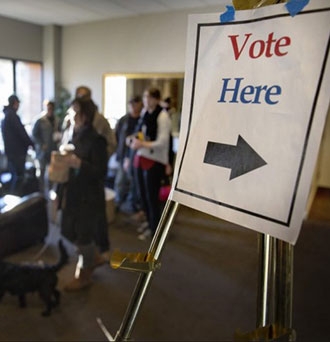
The word "environmentalist" usually conjures up an image of passionate activists ready to hold their leaders and community accountable for responsible environmental practices.
It turns out that's not totally accurate. Voters who say the environment is one of their top two most important issues tend to have pretty abysmal voting records.
Nathaniel Stinnett founded the Environmental Voter Project in Boston, which looks at voters' habits and patterns. He joined WBUR to discuss his findings.
Bob Oakes: What did you find out about voters who self-identify as environmentalists?
Nathaniel Stinnett: In the 2016 presidential election, about 68 or 69 percent of registered voters turned out to vote. The problem is only 50 percent of environmentalists turned out to vote.
In the 2014 midterms, only 21 percent of environmentalists voted. We've got a big turnout problem.
Do you know why?
The honest answer is not only do we not know why, we will never know why.
Any behavioral scientist can tell you it's really hard to set up an experiment to figure out why someone doesn't take an action, like voting.
The best you can do is ask them, and what do you think happens when you ask environmentalists why they don't vote? They lie. They lie their pants off.
We did a survey last year in the Boston area where we asked hundreds of environmentalists who had never voted before why they don't vote, and the overwhelming majority of them said, "Oh no, I always vote."
Who you vote for is secret, but whether you vote or not is public information. ... And so it's really hard to measure why people aren't voting, because even people who don't vote still buy into the societal norm that voting is a good thing.
Step back a little bit. Who are these environmentalists we're talking about?
The typical stereotypes don't hold true. We're not talking about young, wealthy white people anymore. A Latina grandmother living in Phoenix is just as likely to care about climate change as some young hipster living in Somerville or Brooklyn. We're even seeing something we call a "grandmother effect." We now notice that women in their late 50s all the way through their mid-70s are starting to care just as much about climate change as people in their early 20s are.
What's your group doing about the poor turnout, considering the midterm elections? And are you expecting a better turnout from environmentalists?
We think the best way to have an impact in 2018 is to start having an impact in 2017. And so if we get an environmentalist to vote in a municipal election in 2017, it only takes a month or two for the record of that vote to show up in their public voter file, and then every politician who's running for governor or Congress or Senate in 2018 sees the record of that vote and then they start polling those people, they start prioritizing the issues they care about, and they start responding to them.
Do you use peer pressure? Does that help?
It absolutely helps. Peer pressure is one of the most powerful tools we have to get someone to vote. Our research has shown that even people who never vote want to be known as good voters.
So talking about the environment is actually not going to increase their likelihood of voting at all. But if instead, we say something like, "Did you know 94 of your neighbors on your street voted last time there was an election?" Well that increases your likelihood of voting 5, 6, even 7 percent. That might not sound like a lot, but it's a really big deal in this business.
We also send letters to voters reminding them that their voting history is public information. ... And when they find that out, they want to get a better report card. They want to be better citizens.
Do you think the environmental/climate change issue will be a big factor in voter decisions and voter turnout in the 2018 midterms?
Absolutely. I think that President Trump and the Trump administration might be waking a sleeping lion. Whether you agree with his policy proposals or not, he - whether he means to or not - is actually putting climate change front and center, often by getting people who really care about this issue upset, and I think that's going to drive turnout quite a bit in 2018.
This segment aired on August 23, 2017. Click here for audio.
